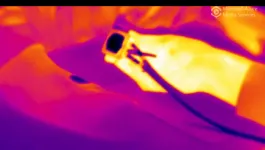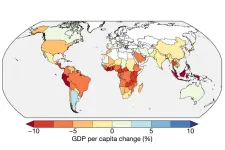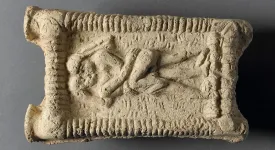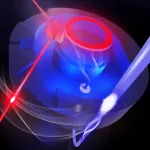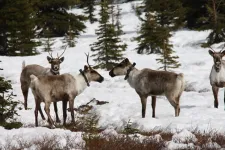(Press-News.org) McGill researchers are exploring a new technique that uses 3D printing and hydrogels. It has the potential not only to improve biomedical implants but could also be useful in the development of human-machine interfaces such as touch screens and neural implants. Biomedical devices like pacemakers or blood pressure sensors that are implanted into the human body need to be fabricated in such a way that they conform and adhere to the body – and then dissolve at the right time.
Using 3D printing and hydrogel technology, researchers in McGill University’s Department of Engineering are moving closer to being able to create devices that better match the human body than the electronic devices currently in use. The researchers say this emerging technology, called soft ionotronics, has the potential to be used to improve wearable and implantable biomedical devices. For example, patients in neuromuscular rehabilitation could benefit from soft and stretchable strain and pressure sensors that can be adhered to their joints.
“Compared to traditional manual fabrication methods, 3D printed ionic junctions can have much better shape fidelity and smaller sizes. Shape fidelity is important for any device to function in the way it is designed. The smaller size means more ionic junctions can be included in one single device of limited size,” said Ran Huo, lead author on the study and PhD candidate in McGill’s Department of Engineering.
Tough Transient Ionic Junctions Printed with Ionic Microgels by Ran Heo et al., was published in Advanced Functional Materials.
END
Using 3D printing to improve implantable biomedical devices, touchscreens and more
2023-05-18
ELSE PRESS RELEASES FROM THIS DATE:
Amputees feel warmth in their missing hand
2023-05-18
“When I touch the stump with my hand, I feel tingling in my missing hand, my phantom hand. But feeling the temperature variation is a different thing, something important... something beautiful,” says Francesca Rossi.
Rossi is an amputee from Bologna, Italy. She recently participated in a study to test the effects of temperature feedback directly to the skin on her residual arm. She is one of 17 patients to have felt her phantom, missing hand, change in temperature thanks to new EPFL technology. More importantly, she reports feeling reconnected to her missing hand.
“Temperature feedback is a nice ...
In years after El Niño, global economy loses trillions
2023-05-18
In the years it strikes, the band of warm ocean water spanning from South America to Asia known as El Niño triggers far-reaching changes in weather that result in devastating floods, crop-killing droughts, plummeting fish populations, and an uptick in tropical diseases.
With El Niño projected to return this year, Dartmouth researchers report in the journal Science that the financial toll of the recurring climate pattern can persist for several years after the event itself—and cost trillions in lost income worldwide. The study is among the first to evaluate the long-term costs of El Niño and projects losses that far exceed ...
Fear of large predators drives smaller predators into areas they perceive as safer, but where risk is greater
2023-05-18
Medium-sized carnivorous species – mesopredators like coyotes or bobcats – tend to move into human-dominated areas to avoid predation by larger carnivores, a phenomenon also known as the “human shield” effect. However, according to a new study, doing so places these safety-seeking species at considerably greater risk for mortality due to human activities. The findings describe a “paradox of the lethal human shield” for mesopredators, which could become an increasingly important driver of carnivore community dynamics and ecological trophic structures as species restoration and recovery efforts expand the coexistence of ...
Ancient history of kissing and its role in disease transmission
2023-05-18
In a Perspective, Troels Arbøll and Sophie Rasmussen review the ancient history of kissing, particularly the emergence of romantic-sexual kissing in Mesopotamia more than 4000 years ago and its role in the evolution and spread of orally transmitted diseases like herpes simplex virus 1 (HSV-1). They say the kiss cannot be regarded as a sudden biological trigger causing a spread of specific pathogens, as some research has recently proposed. “Evidence indicates that kissing was a common practice in ancient times, potentially representing a constant influence on the spread of orally transmitted microbes, such as HSV-1,” ...
Global analysis reveals widespread decline in lake water storage worldwide
2023-05-18
The amount of water stored in more than half of the largest lakes and reservoirs worldwide is declining, according to a new study. This drying is largely attributable to a warming climate and increased human impacts. The findings underscore the importance of accounting for these impacts in future surface water resources management strategies. Although they cover roughly 3% of the global land area, lakes hold 87% of Earth’s liquid surface fresh water. These features also provide essential ecosystem services and are key components in global biogeochemical processes. Many of these benefits are modulated by lake water storage (LWS), which ...
Unmanaged global forests have limited carbon sequestration potential
2023-05-18
Even if all direct human management of global forests ended immediately, their carbon sequestration potential would not be enough to curb ongoing climate change, according to a new study. The findings suggest that the planet’s current forests have only limited remaining carbon storage potential – even under the most unlikely of scenarios – to substantially mitigate atmospheric carbon dioxide (CO2) without major reductions in emissions. By capturing and storing carbon in biomass and soil organic matter, forests are integral to the global carbon cycle. As a result, the planet’s forests are often considered a central component in climate ...
Half of world's largest lakes losing water
2023-05-18
More than 50 percent of the largest lakes in the world are losing water, according to a groundbreaking new assessment published today in Science . The key culprits are not surprising: warming climate and unsustainable human consumption.
But lead author Fangfang Yao, a CIRES visiting fellow, now a climate fellow at University of Virginia, said the news is not entirely bleak. With this new method of tracking lake water storage trends and the reasons behind them, scientists can give water managers and communities insight into how to better protect critical sources of water and important regional ecosystems.
“This is the first comprehensive assessment of trends ...
Humanity’s earliest recorded kiss occurred in Mesopotamia 4,500 years ago
2023-05-18
Recent research has hypothesised that the earliest evidence of human lip kissing originated in a very specific geographical location in South Asia 3,500 years ago, from where it may have spread to other regions, simultaneously accelerating the spread of the herpes simplex virus 1.
But according to Dr Troels Pank Arbøll and Dr Sophie Lund Rasmussen, who in a new article in the journal Science draw on a range of written sources from the earliest Mesopotamian societies, kissing was already a well-established ...
Wiring up quantum circuits with light
2023-05-18
Quantum computers promise to solve challenging tasks in material science and cryptography that will remain out of reach even for the most powerful conventional supercomputers in the future. Yet, this will likely require millions of high-quality qubits due to the required error correction.
Progress in superconducting processors advances quickly with a current qubit count in the few hundreds. The advantages of this technology are the fast computing speed and its compatibility with microchip fabrication, but the need for ultra-cold temperatures ultimately confines the processor in size and prevents any physical ...
Call for Canada, US to braid Indigenous rights, endangered species laws
2023-05-18
Climbing caribou numbers in northeastern British Columbia prove that collaborations between Indigenous and colonial governments can reverse decades-long declines, but focus needs to shift to culturally meaningful recovery targets, a consortium of researchers and community members say in a new paper published this week in Science.
UBC Okanagan’s Dr. Clayton Lamb and West Moberly First Nation Chief Roland Willson co-lead the paper, Braiding Indigenous Rights and Endangered Species Law, alongside nine others for the influential journal.
“Abundance matters. There are many cases where endangered species laws have prevented extinction, but the warning signs ...
